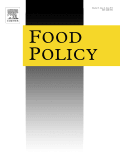
FOOD POLICY
Scope & Guideline
Catalyzing change in food-related governance and practices.
Introduction
Aims and Scopes
- Food Security and Nutrition:
Research focuses on the policies and practices that enhance food security and improve nutrition, particularly in vulnerable populations. - Agricultural Policy and Economics:
Explores the economic impacts of agricultural policies, including trade agreements, subsidies, and market access, on food systems. - Sustainable Food Systems:
Examines practices and policies that promote sustainability within food systems, including environmental impacts and resource management. - Consumer Behavior and Food Choices:
Investigates how consumer preferences, social norms, and labeling affect food choices and dietary practices. - Value Chain Analysis:
Utilizes value chain frameworks to understand the dynamics of food production, distribution, and consumption, and to identify areas for intervention. - Impact of Climate Change on Food Systems:
Analyzes the effects of climate change on agricultural productivity, food security, and nutrition, proposing adaptive strategies. - Public Health and Food Policy:
Studies the relationship between food policies and public health outcomes, including diet-related diseases and nutrition education. - Policy Evaluation and Effectiveness:
Focuses on assessing the effectiveness of food policies and programs through empirical research and case studies.
Trending and Emerging
- Resilience and Adaptation Strategies:
Research increasingly focuses on building resilience within food systems to withstand shocks such as climate change, pandemics, and economic crises. - Interdisciplinary Approaches to Food Policy:
There is a growing trend towards interdisciplinary research that combines insights from economics, public health, environmental science, and sociology to address complex food policy issues. - Technological Innovations in Agriculture:
Emerging studies explore the impact of technological advancements, such as digital tools and precision agriculture, on improving food production and distribution. - Behavioral Insights and Nudging:
The application of behavioral science to promote healthier food choices and reduce food waste is gaining traction, indicating a shift towards understanding consumer behavior in food policy. - Equity and Social Justice in Food Systems:
Research increasingly emphasizes the importance of equity and social justice, focusing on how food policies can address disparities and promote inclusive food systems. - Climate Change Mitigation and Food Systems:
Emerging themes include the role of food systems in climate change mitigation, with a focus on sustainable practices and policies that reduce carbon footprints. - Food Sovereignty and Self-sufficiency:
A growing number of studies are examining concepts of food sovereignty and self-sufficiency as alternatives to conventional food aid and global food systems.
Declining or Waning
- Traditional Agricultural Practices:
Research on conventional farming methods is becoming less prominent as the focus shifts towards innovative and sustainable agricultural practices. - Single-issue Policies:
There is a noticeable decline in studies focusing solely on single-issue policies, such as those that do not consider the broader implications for food systems. - Local Food Systems:
While local food systems were previously a major area of interest, recent publications indicate a waning focus in favor of broader, global analyses of food value chains. - Food Safety Regulations:
Research on food safety regulations has decreased as attention turns to more holistic approaches that integrate safety within the broader context of food security and sustainability. - Food Aid Programs:
The frequency of studies specifically addressing traditional food aid programs is declining, possibly due to a shift towards understanding food sovereignty and self-sufficiency.
Similar Journals
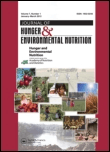
Journal of Hunger & Environmental Nutrition
Empowering Research for a Healthier Planet and PeopleThe Journal of Hunger & Environmental Nutrition is a premier publication dedicated to exploring the intricate relationships between food security, environmental sustainability, and nutrition. Published by Routledge Journals, Taylor & Francis Ltd, this journal has continually contributed to critical dialogues in the fields of public health, nutrition, and environmental science since its inception in 2006. With a commendable impact factor and recognized quartile rankings—Q2 in Health (Social Science) and Public Health, alongside Q3 in Nutrition and Dietetics for 2023—this journal stands as an essential resource for researchers, practitioners, and students alike. The scope of the journal covers diverse topics ranging from the socio-economic factors influencing hunger to the environmental challenges posed by food systems. By offering insightful research and fostering interdisciplinary collaboration, the Journal of Hunger & Environmental Nutrition not only informs policy development but also advocates for effective solutions to pressing global issues. Readers can access articles through institutional subscriptions, ensuring a wealth of knowledge is always at your fingertips.
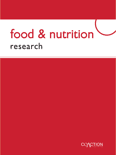
Food & Nutrition Research
Unlocking the Secrets of Nutrition for Better LivingFood & Nutrition Research is a distinguished open-access journal published by the Swedish Nutrition Foundation, dedicated to advancing the field of food science and nutrition. With its ISSN 1654-6628 and E-ISSN 1654-661X, the journal has established itself as a leading platform for disseminating high-quality research since its transition to open access in 2008. Based in Lund, Sweden, this journal covers a broad spectrum of topics related to nutrition and dietetics, public health, and environmental health, achieving impressive rankings across several categories, including Q1 in Food Science and Q2 in Nutrition and Dietetics for 2023. Researchers and practitioners benefit from its accessibility and the opportunity to stay updated with significant developments in the field, given its notable Scopus rankings, which place it within the top percentiles of related disciplines. With converged years spanning from 2008 to 2024, Food & Nutrition Research serves as an essential resource for those committed to improving health outcomes through informed dietary practices.
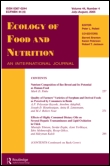
ECOLOGY OF FOOD AND NUTRITION
Integrating Ecology and Nutrition for Global ImpactECOLOGY OF FOOD AND NUTRITION is a premier academic journal published by Taylor & Francis Inc, focusing on the intricate relationships between food systems, ecology, and nutrition. With an ISSN of 0367-0244 and an E-ISSN of 1543-5237, this journal has been a vital platform for scholarly communication since its inception in 1971, and it will continue to disseminate impactful research until at least 2024. Operating from the United Kingdom, it holds a distinguished position with a Q2 ranking in both Ecology and Food Science, along with a Q3 ranking in Medicine (miscellaneous) for 2023. Notably, its Scopus rankings reflect its influence in the fields of Environmental Science and Medicine, making it a crucial resource for researchers and professionals seeking to explore the interactions between ecological systems and nutritional practices. While the journal is not open access, it provides vital insights and findings that contribute to advancements in sustainability, health, and food security. As interdisciplinary research continues to grow, ECOLOGY OF FOOD AND NUTRITION remains essential for anyone interested in the future of food and environmental health.
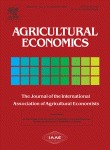
AGRICULTURAL ECONOMICS
Exploring the nexus of economics and agronomy.AGRICULTURAL ECONOMICS, published by Wiley, is a premier journal dedicated to advancing the understanding of agricultural economics, with an ISSN of 0169-5150 and an E-ISSN of 1574-0862. This esteemed publication serves as a vital resource for researchers, professionals, and students in the fields of Agronomy and Crop Science, as well as Economics and Econometrics, consistently reflecting its high standing as evidenced by its 2023 Q1 ranking in both categories. With a comprehensive scope spanning from 1986 to 2024, the journal presents rigorous analysis and innovative research that informs policy decisions and enhances agricultural practices globally. Although it does not provide open access options, the rich academic content invites a dedicated readership committed to strengthening the agricultural sector through evidence-based insights. The journal is particularly noted for its impressive Scopus rankings, placing it among the top-tier resources for understanding the complex interplay between economic theory and agricultural development.

Nature Food
Driving Innovation in Food Science and Sustainability.Nature Food, an esteemed journal published by NATURE PORTFOLIO, stands at the forefront of research in Agronomy, Animal Science, and Food Science. With its E-ISSN 2662-1355 and a remarkable recognition of being ranked Q1 in three essential categories by Scopus in 2023, it is tailored for researchers, professionals, and students dedicated to the advancement of knowledge in these fields. Situated in the United Kingdom and extending its reach globally, the journal has displayed an impressive ranking, placing it in the top percentiles of Agricultural and Biological Sciences, highlighting its vital place in fostering innovative research and scholarly communication. The journal's scope encompasses a wide array of topics critical to food systems, sustainability, and agricultural practices, making it an invaluable resource for anyone looking to stay ahead in this dynamic area of study. With access options designed to enhance the visibility and dissemination of research findings, Nature Food is committed to promoting open dialogue and collaboration among the global academic community, driving forward our understanding of food security and environmental stewardship.

African Journal of Agricultural and Resource Economics-AFJARE
Connecting researchers to shape Africa's agricultural landscape.African Journal of Agricultural and Resource Economics (AFJARE) is a dynamic publication dedicated to advancing the fields of agricultural and resource economics within the context of Africa. Published by the African Association of Agricultural Economists, this journal serves as a vital platform for researchers, professionals, and students to disseminate their findings and engage with contemporary issues affecting the agricultural sector across the continent. With an ISSN of 1993-3738 and an E-ISSN of 1993-3738, AFJARE aims to reach a wide audience through its commitment to open access, ensuring that crucial research is accessible to all. The journal has recently established itself in the academic landscape, achieving a Q3 ranking in Agricultural and Biological Sciences and a Q4 ranking in Economics and Econometrics for 2023. Covering a diverse scope from 2018 to 2023, AFJARE encourages submissions that explore innovative economic strategies and policies that can foster agricultural development and resource management in Africa. With its growing impact and relevance, AFJARE is poised to become a cornerstone in the discourse on agricultural economics in Africa and beyond.
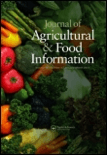
Journal of Agricultural & Food Information
Empowering Research for Sustainable Food Systems.Welcome to the Journal of Agricultural & Food Information, a pivotal platform for disseminating research and insights across the domains of agronomy, food science, and information systems management. Published by Routledge Journals, Taylor & Francis Ltd, this esteemed journal, with an ISSN of 1049-6505 and E-ISSN 1540-4722, plays a crucial role in bridging the gap between innovative agricultural practices and food information systems. Despite its current categorization in the Q4 quartile across relevant fields, it remains committed to fostering scholarly dialogue and encouraging interdisciplinary collaboration. With a history of publication spanning multiple converged years from 1993 to 2024, the journal is dedicated to publishing high-quality, peer-reviewed articles that address the challenges and advancements in agricultural and food information. Currently not available as Open Access, this journal provides valuable insights for researchers, professionals, and students who are eager to harness information for the progress of food security and sustainable agricultural practices. Join the conversation in enhancing our understanding and application of vital agricultural and food-related information.
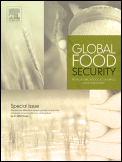
Global Food Security-Agriculture Policy Economics and Environment
Fostering interdisciplinary dialogue for a sustainable food future.Global Food Security - Agriculture Policy Economics and Environment is a leading interdisciplinary journal published by Elsevier that addresses critical issues in food security through the lens of agriculture, economics, and environmental sustainability. With an impressive impact factor and a distinguished placement in the Q1 quartile across multiple categories including Ecology, Food Science, and Safety Research for 2023, this journal is a vital resource for researchers and practitioners aiming to address modern challenges in global food systems. Covering essential topics from agricultural policy to ecological implications, the journal provides a platform for innovative research and policy discussions that foster the advancement of food security on a global scale. Notably, it is indexed in Scopus, where it ranks in the top percentiles across its relevant categories, reflecting its significance in the field. The journal is accessible to a wide audience, making it an indispensable source of knowledge for professionals and students aiming to tackle the complex interplay between food production and environmental stewardship.
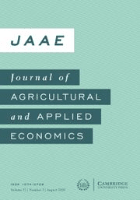
Journal of Agricultural and Applied Economics
Shaping the future of agriculture with open access insights.The Journal of Agricultural and Applied Economics, published by Cambridge University Press, stands as a leading platform for disseminating innovative research in the fields of agriculture, economics, and applied sciences. With an impressive impact factor and a prestigious Q1 ranking in Agricultural and Biological Sciences and Q2 in Economics, this journal is recognized for its rigorous peer-reviewed content that addresses contemporary challenges in agricultural and economic policies. Since its transition to Open Access in 2015, it has widened its reach, allowing scholars, practitioners, and students unrestricted access to vital research findings. The journal's scope encompasses a wide array of topics, fostering interdisciplinary dialogue and offering insights essential for informed decision-making in the agricultural sector. Addressing critical issues from food security to sustainable practices, the Journal of Agricultural and Applied Economics is instrumental for anyone seeking to contribute to the advancement of knowledge in these pivotal areas.
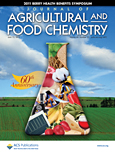
JOURNAL OF AGRICULTURAL AND FOOD CHEMISTRY
Transforming Agricultural Practices Through ResearchJOURNAL OF AGRICULTURAL AND FOOD CHEMISTRY, published by the American Chemical Society, serves as a premier platform for disseminating cutting-edge research in the field of agricultural and food chemistry. With an impressive impact factor and ranked in the Q1 quartile for both Agricultural and Biological Sciences and Chemistry categories, this journal is recognized for its high-quality contributions that influence practices in food safety, nutrition, and agricultural productivity. Since its inception in 1953, the journal has dedicated itself to providing valuable insights and innovative approaches to complex challenges facing these intertwined fields. Researchers and professionals in academia and industry alike will find the JOURNAL OF AGRICULTURAL AND FOOD CHEMISTRY to be an essential resource for advancing knowledge and fostering collaboration in agricultural sciences and food chemistry.